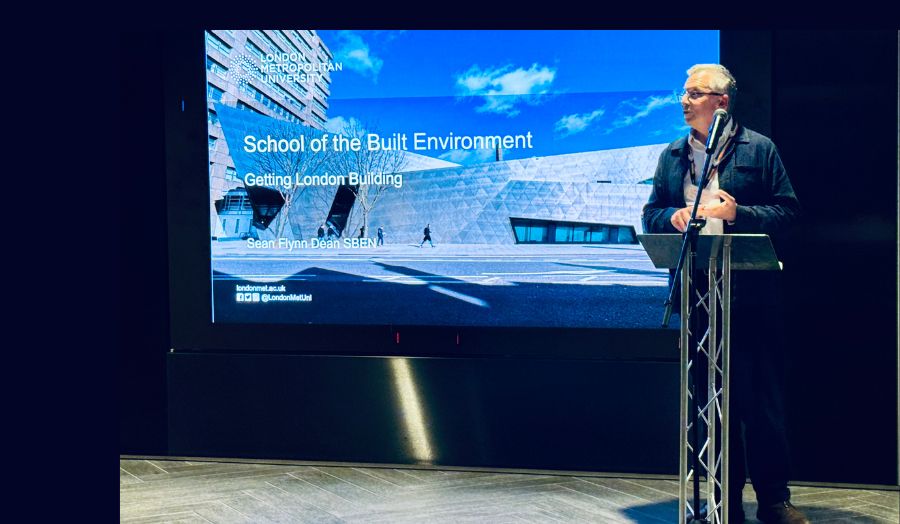Apply for this course
Please select when you would like to start:
If you're a UK applicant wanting to study full-time starting in September, you must apply via UCAS unless otherwise specified. If you're an international applicant wanting to study full-time, you can choose to apply via UCAS or directly to the University.
If you're applying for part-time study, you should apply directly to the University. If you require a Student visa, please be aware that you will not be able to study as a part-time student at undergraduate level.
Why study this course?
The demand for expert construction professionals is steadily on the rise, both in the UK and internationally. London Met’s School of the Built Environment has designed this BSc course to develop you into a highly skilled construction manager.
If you have ambitions to manage projects, make a real-world contribution to the future low carbon built environment and work with other expert problem solvers within the field, this could be the perfect course for you. By working on real world projects, you’ll engage in authentic learning and assessment and will have the opportunity to work in collaboration with national and international organisations. You’ll get first-hand experience of the types of challenges, excitement and opportunities a career in construction can offer.
On our forward-thinking course, you will be taught both traditional and contemporary construction management techniques. You’ll be taught by a combination of leading academics and practitioners, providing you with the keys to unlock your full potential within the construction industry.
What’s more, you’ll study in our vibrant Holloway campus, within a 10-minute Tube journey of the City and West End, both of which are full of life, culture and opportunity.
Become a highly skilled construction manager
We've designed this course to develop you into a construction manager capable of leading, planning and delivering projects from start to finish
Gain experience of industry standard technologies
This experience will enhance your employability skills and develop you into a next generation science, technology, engineering, and mathematics (STEM) professional
Taught by a combination of leading academics and practitioners
We have strong links with employers active in all aspects of the built environment and involve them in our curriculum design
Course modules
The modules listed below are for the academic year 2024/25 and represent the course modules at this time. Modules and module details (including, but not limited to, location and time) are subject to change over time.
Year* 1 modules
Year 2 modules
Year 3 modules
Built Environment Principles
This module currently runs:all year (September start) - Tuesday morning
(core, 30 credits)
In this module you will learn about the key principles that underpin the built environment. You will be introduced to the stakeholders who have an involvement in the built environment and the building process including, construction professionals, landowners, government, local authorities, investors, developers, and the public. You will explore their roles and responsibilities and how they impact on construction projects and the wider built environment.
You will develop an understanding of the design, planning, financing, construction, sale and operation of organisations, products, buildings, infrastructure, and places within which people live, work and travel.
You will learn to use techniques such as PESTLE to help you analyse the wider context, taking into account Political, Economic, Sociological, Technological, Legal and Environmental factors that will have an influence on your work, both nationally and globally.
You will look at everything through the lens of sustainability, and equality, diversity, and inclusion (EDI) which is essential if you are to become a professional and ethical practitioner.
The module involves the creation of a Professional Development Journal (PDJ) which students reflect on their learning in and outside the classroom. The PDJ is an iterative journal, developed over each year of students’ studies through levels 4, 5 and 6, and is assessed at each level. Students will be supported in learning about reflection, the software used for the PDJ and there will be opportunities for formative feedback and class discussion throughout the module.
By the end of this module, you will have a clear understanding of the key factors at play in the Built Environment. You will also have developed valuable research and critical thinking skills and acquired a greater understanding of the industry to help with your future career planning. You will start your journey towards becoming a built environment professional by becoming a student member of an appropriate professional body.
Read full detailsConstruction Site Engineering and Infrastructure
This module currently runs:spring semester - Tuesday afternoon
(core, 15 credits)
In this practical module, you will gain hands-on experience as you learn to operate surveying equipment as used by industry. You will learn how to record, collate, analyse, and present data. You will build a clear understanding of the importance of ensuring that data is accurately collected and reported, as well as the impact of errors in any aspect of the process. You will be given the skills to undertake surveys and to measure buildings using the most up-to-date techniques as well as using traditional methods.
To do this you will take part in real practical surveying workshops. The workshops will be designed to present you with scenarios which require you to solve authentic site engineering challenges faced in industry. You will gain hands-on experience of operating basic surveying equipment to collect data to inform the project team, and to communicate to the site team requirements with regards to site operations.
You will study and interpret construction drawings. This will require you to bring together the complementary skills you will be gaining in other modules you are studying in your first year. The ability to interpret construction drawings is fundamental to you being able to communicate complex information to the site team who will be constructing the project.
The module will also introduce you to the construction materials, technologies, and methods used on infrastructures projects such as roads, sewers, and services, which typically form part of the brief with regards to site-surveying and setting-out.
Read full detailsConstruction Technology and Building Services
This module currently runs:all year (September start) - Thursday afternoon
all year (September start) - Thursday morning
(core, 30 credits)
Professionals in the built environment need to have expert knowledge and understanding of construction technology and building services, and their contribution towards a sustainable built environment. This module introduces you to both traditional and modern construction technology used in residential and low-rise construction. It will explore how they are being used to lessen the environmental impact of construction projects and building operation. You will learn about how services are incorporated into construction projects in a sustainable way, including water, heating, drainage, energy and data.
Throughout the module, you will learn the role of statutory government regulation in construction and the importance of health & safety for the workforce during the construction phase, and the occupants once the building is handed over.
By the end of this module, you will have a clear understanding of a variety of construction technologies and building services and an appreciation of their contribution towards a sustainable built environment. You will have developed valuable technical, research and critical thinking skills including an understanding of how to interpret drawings which communicate construction information to professionals and skilled tradespersons.
Read full detailsDesign, Procurement and Management
This module currently runs:autumn semester - Tuesday afternoon
(core, 15 credits)
This module will introduce you to key stages of the design, procurement, and management of construction projects.
You will gain detailed knowledge and understanding of the project lifecycle, the stakeholders involved at each stage, and the outputs generated through collaborative working.
You will consider the internal and external factors which influence a project’s feasibility and scope, including micro and macro-economic factors. You will examine what is required to put together a robust business case and the influence of project budget and project risks on a client’s requirements.
Project briefs will be studied, including how to capture a client's requirements regarding project outcomes, and communicate key success indicators such as sustainability, costs, timelines, and quality.
Supply chain management is key to successful project design, construction, and handover, and you will explore the different types of procurement routes available to the project team and how the project supply chain contribute to a successful project delivery.
You will expand your knowledge of the industry through exposure to a range of professional roles involved in these stages of a project including consultants and other suppliers of goods and services who are present in a typical construction project cycle.
Read full detailsMaterials Science and Structural Principles
This module currently runs:all year (September start) - Thursday morning
all year (September start) - Thursday afternoon
(core, 30 credits)
This module will provide you with a hands on, practical and engaging introduction to this fascinating subject area. Over the course of the module, you will gain an understanding of fundamental materials science and knowledge of the composition and performance of key construction materials. You will explore the mechanical behaviour of materials used in a variety of construction applications as well as their environmental credentials. The module will introduce you to simple structural forms and you will consider how loads are transferred through a building and through the foundations to the substrata.
By the end of the module, you will be able to identify and describe the form and function of various structural materials and elements. You will have an understanding of the strength, stability and performance behaviour of structures and materials under applied loading. This will help you to appreciate the importance of appropriate material selection and the value of design codes in structural engineering. Throughout the module you will undertake practical experiments and tests to develop your statistical, analytical and problem-solving skills. You will be introduced to data science and big data analytics and begin to develop your awareness and familiarity with data analysis techniques.
Read full detailsAdvanced Construction Technology and Structures
This module currently runs:autumn semester - Tuesday
(core, 30 credits)
The module aims to further develop your knowledge and understanding of construction technology and structural principles. It will build upon the technology, science and structures introduced to you at level 4. The focus of the module moves on from the residential and low-rise construction types you have studied to more complex commercial, industrial, and multi-storey construction typologies. You will undertake in-depth study and research of the construction technology and structural principles associated with long span and multi-storey construction.
Context will be provided using case studies to explain and bring to life construction technologies and structural principles. Key documents such as the building regulations are used as reference points throughout to help you understand how particular construction types comply with performance requirements such as structural performance, fire safety, resistance to sound, thermal performance, and drainage and waste disposal.
You will explore the drivers and technologies behind the move to constructing and conserving sustainable built environments and be presented with examples of responses at differing scales. The module will explore how both traditional and modern construction technologies are being used across the globe.
Through studying this module, you will be required to consider how factors such as climate change, urbanisation, carbon reduction targets, skill shortages and material availability are impacting the construction technologies and structural forms being adopted by the built environment sector.
The knowledge gained will enable the student to understand and appraise the contributions construction technology and structural principles can make towards a sustainable built environment.
By the end of the module students should be able to evaluate the following:
• The contribution of technology towards a sustainable built environment
• The drivers for technological change
• The appropriateness of different construction technologies including foundations, structural frames, roof and cladding systems
• Structural load paths in commercial, industrial, and multi-storey constructions
• Types of temporary works
• Traditional construction techniques
• Sustainable construction materials and methods
• The contribution construction technology can make towards a reduction in building operational energy demand
• The application of relevant legislation and regulations including the building regulations
Advanced Site Engineering and Surveying Practice
This module currently runs:spring semester - Wednesday afternoon
(core, 15 credits)
In this module you will study advanced site engineering and surveying practices which are an integral part of a construction manager’s role and responsibilities. The module will cover areas such as geotechnics, engineering geology, geo-environmental engineering and site surveying and setting out.
In studying this module, you will gain the knowledge and skills to contribute to the delivery of more complex ground engineering and foundation projects. You will study the nature of the site investigation process, including retrieval and analysis of sub-soil samples to allow the identification of soil types and an assessment of their performance characteristics. This information is vital in assisting the civil engineer in their design of groundwork solutions. The module will then move on to consider methods of excavation and their suitability for use in different ground conditions, foundation solutions and other ground engineering works, including those vital to infrastructure development such as tunnelling and culverting.
Site surveying and setting out will also be covered in the module and you will take part in hands on practical exercises to explore the principles of setting out for things such as earthworks, roads, drainage, strip, and pile foundations. You will engage in outside activities and use levelling instruments and total stations which perform multiple functions such as setting out and distance measurement.
Upon successful completion of this module, you will be able to:
• Identify and appraise a wide range of site investigation methods
• Understand, through geotechnics, the different performance characteristics of various ground conditions including soil and rock types
• Propose foundation solutions based on information gained during site investigations
• Examine proposed solutions against the relevant legislation and regulations such as Building regulations
• Propose ground remediation techniques when encountering challenges such as contamination or high-water tables.
• Undertake levelling exercises to establish and maintain datums and transfer levels around a construction site.
• Undertaking setting out exercises in connection with construction and infrastructure projects.
• Collect, collate and process data obtained during site investigation and surveying exercises.
• Undertake Risk assessments and method statements for complex site engineering works.
• Use data to drive decision making.
Building Pathology and Refurbishment
This module currently runs:autumn semester - Wednesday afternoon
(core, 15 credits)
In this module you will focus on studying the interpretation, conservation and restoration of the built environment in the UK and around the globe.
Through studying building pathology, you will gain an understanding of common and more unique building defects, the root causes of them and solutions available to remedy them. Identifying reasons for failure is one which requires you to have an enquiring mind and voyage on a journey of discovery, through which you will gain an understanding of the building fabric, its services, its users, and the wider environs, all which can impact positively or negatively on a building's preservation. This holistic approach can include gathering historical information regarding the building, undertaking detailed inspections, including intrusive investigations, and observing the building occupants' interactions with the building fabric and services. Building pathology is a combination of science, surveying and technology and will draw upon your knowledge, creativity, and problem-solving skills.
In addition to pathology, you will study the allied subject area of building refurbishment, covering restoration, adaption, and retrofitting. When a building has outlived its usefulness, an option often chosen is to demolish it and rebuild something new in its place. However, we are recognising that when we demolish, the carbon which was generated during its original construction, something we term as being embedded into the original building, is replaced by even more carbon generated in connection with the new building’s materials, manufacturing, and construction. Refurbishing and adapting buildings are the sustainable ways to meet new needs. This can include retrofitting energy efficiency measures, from the very simple options to grand schemes. Furthermore, in terms of sustainability in its wider sense, retaining the heritage of our built environment is important for the character of an area and preserving heritage value for future generations. There is a need to have an understanding as to when demolition is not the answer and refurbishment and/or repurposing an existing building is the right thing to do. This module will equip you with the knowledge and skills to be able to advise on appropriate building technology solutions to upgrade and/or repurpose a building.
Upon successful completion of this module, you will be able to:
• Identify and appraise a wide range of building types and their elemental parts
• Undertake simple condition surveys of buildings
• Prepare an evidence base of an existing building upon which decisions can be made as to how to remedy defects found
• Assess the impact of occupational behaviours on a budling's performance and condition
• Understand means by which you can identify deleterious materials, the implications to the building and people of such materials and managing their removal where required
• Appraise various conservation techniques on modern and historical built environment assets
• Appraise the similarities and differences between refurbishment, restoration and retrofitting
• Assess the various factors causing building obsolescence and mitigation against demolition of such buildings
Environmental Science and Sustainability
This module currently runs:spring semester - Tuesday
(core, 30 credits)
The importance of sustainable development is increasingly acknowledged and accepted throughout society, but we still need to identify tangible ways sustainable developments can be implemented in practice. For construction professionals the challenge is to understand how to achieve compliance with the ever-stringent operational energy allowances for both residential and commercial buildings and other environmental targets.
Through studying this module, you will gain the knowledge and skills to identify, develop, test, and propose specific responses to a range of pressing sustainability challenges. These responses may be rooted in meeting the global Sustainable Development Goals, or in the need for local and global urgent actions driven by multiple factors including the climate change emergency, population growth, water shortages, population shifts, conflict, and urbanisation. The module will also consider the role infrastructure plays in our future built environment, infrastructure which must provide sustainable and globally available benefits through, for example the fair distribution of access to water, energy, waste management, and transport. Using case studies, the module will show how guiding principles for sustainable development can deliver sustainable solutions in practice. You will study the process of change and innovation in the built environment and consider the drivers which are demanding we move quickly and where appropriate challenge outdated traditions or embrace long held but underused traditional building techniques.
Upon successful completion of this module, you will be able to:
• recognise the wider sustainability context and how this influences the design and construction of residential, commercial and infrastructure assets within the built environment.
• understand the drivers behind the move towards low operation energy buildings, including legislation and regulations in the UK and beyond.
• assess the contribution passive and active design has on operational energy demands.
• appraise the input of renewables at local, national, and global scales
• understand domestic and commercial building services including lighting, ventilation, heating, water, drainage, and power.
• undertake energy demand calculations for both residential and commercial building at both an elemental level and a whole building level.
• understand the fundamental science behind heat transfer in buildings.
• evaluate the contribution of quality control during the construction process. including its influence on airtightness, cold bridging, condensation, and thermal performance of buildings.
• appraise and advise on both modern and traditional construction techniques and appropriate building services.
Project Management and Contract Administration
This module currently runs:all year (September start) - Wednesday morning
(core, 30 credits)
Construction project managers and contract administrators are expert professional disciplines in demand around the globe. They occupy a central role in the construction project development and delivery process, and are key to driving the successful completion of projects.
This module will introduce you to the tools and techniques available for successful construction project management and contract administration. It examines best practice in the built environment industries in a local and a global context. It will consider how organisational strategic objectives drive projects and the role the project manager performs in the early stages of the project lifecycle. It will take a detailed look at contract, procurement and tendering practice, and the construction, commissioning and handover stages of a project. The importance of stakeholder management will be covered throughout. It will consider the role of construction project management in the global move towards a sustainable and low/zero carbon, built environment.
Through studying the module, you will develop a critical awareness of project procurement, tendering, planning and delivery principles alongside developing the skills necessary to deploy them to manage a construction project. Through enquiry-based learning you will study an authentic project scenario to allow you to deploy the tools necessary to successfully plan a project and monitor a project's resources. Throughout, the module will contextualize construction project management with regards to the sustainable, inclusive and ethical, project management of projects.
The syllabus is guided by professional body project management bodies of knowledge and codes of practice (such as the APM and CIOB). The module explains the strategic context within which projects operate to enable the students to understand that a project needs to have a strategic fit with the organisation's wider aims and ambitions, and the operational phases of project management including pre-construction, construction, and handover. By the end of the module students should be able to critically evaluate the following:
• the link between organisational strategy, programmes, and projects
• project management tools and techniques to monitor and control the complete project lifecycle
• the challenges of leading a complex project
• procurement and tendering practice
• effective methods to manage the operational project stage
• the competencies required of their project team
• project value
• the link between project change and risk and how to manage them
• the contribution project management makes towards a sustainable built environment
• internal and external stakeholders and how to manage their expectations.
• the production and control of a detailed project delivery plan which evaluates and manages project risk and includes a programme identifying project milestones, resource requirements, critical path and a site layout
Advanced Fire Safety
This module currently runs:spring semester - Wednesday morning
(core, 15 credits)
The module aims to develop a critical awareness of the nature of fire. It will consider the nature of the combustion process, the spread of fire and human behaviour in fire situations. Methods of achieving adequate protection of buildings through appropriate material choice, compartmentation of a building, appropriate means of refuge and escape for occupiers will be covered, alongside how to specify appropriate fire detection and suppression systems. The module will require students to formulate solutions to problems according to circumstance and context will be achieved through testing solutions against the relevant rules and regulations, including the building regulations approved documents. Case studies will be used to demonstrate the impact of fire and its ability to spread rapidly within a building.
By the end of the module students should be able to demonstrate a deep knowledge and understanding of:
• Legislative fire safety requirements relating to the design, construction, and use of buildings
• The various stakeholders specific to each project, their needs, and expectations in relation to fire safety
• Fire science (chemistry and physics)
• The performance and classification of building materials and systems in fire
• Factors and actions that influence human behaviour in fire, and how they can be translated into safer design, construction, and use of buildings
• Fire Strategy development and implementation
• Factors to be taken into consideration when determining an appropriate evacuation philosophy
• Selection and specification of an appropriate fire detection and alarm system to support the Fire Strategy
• Fire containment and suppression
• Application of various active and passive fire safety features to support life safety, property safety and business continuity objectives
• The contribution of suitably qualified competent persons and construction trades to fire safety
• The importance of quality control within the design, construction, and commissioning processes
Applied Research Project
This module currently runs:all year (September start) - Wednesday morning
(core, 30 credits)
The module will provide you with the opportunity to undertake an in-depth study of a subject which is of personal and subject interest in the field of the built environment. You may focus your research upon a topic or challenge relevant to your current programme of study and based upon an academic subject of interest, your current work practice or recent work experience or placement. The submission will take the form of a dissertation.
You are encouraged to develop your critical thinking and undertake theoretically informed research. The module will develop your understanding of the linkages between conceptual issues, subject area, and research methods.
The module will introduce you to research methods and strategies which are appropriate to your chosen area of study. It will provide you with experience in the planning and implementation of a research project and the subsequent writing up of research findings in a dissertation.
You will be introduced to this module before the end of the level 5 academic year. This introduction will take the form of a briefing session to enable you to begin the process of considering potential areas of study ahead of the next academic year.
Read full detailsConstruction Management Practice
This module currently runs:autumn semester - Friday
(core, 30 credits)
This module consolidates and extends learning from previous modules around the role of a construction manager, requiring you to apply this learning to different project types and contexts, and undertake a variety of tasks. You will learn more about planning and programming of construction projects, their financial management and assessing risks of construction processes.
As well as examining the fundamentals of construction project management, the module considers contemporary project management methodologies. The module will consider case studies and the latest research in this dynamic area.
The module will assist you in constructing a portfolio of evidence of your knowledge of construction management and contemporary project management methodologies. As professional project managers are deployed on built environment projects across the globe the module will consider the challenges in successfully managing projects across different geographical locations and cultures. Throughout, the module will contextualise project management with regards to sustainable, inclusive, and ethical management of projects.
By the end of the module students should be able to demonstrate a deep knowledge and understanding of:
• planning and programming of construction projects
• legal environment
• resource management
• change management
• people management
• financial management (final accounts, claims and dispute resolution)
• preparing method statements and risk assessments
• health, safety and well being
• waste management and resource efficiency
• the project management discipline
• the contemporary trends in project management
• how to select appropriate project management methodologies to suit a variety of project types and contexts.
• principles and practice of project control
• the roles of the professional bodies
• how to accommodate diverse discipline, cultural, legal, economic and environmental requirements within a project.
• the impact of technology on the management of projects
• country context on project management methodologies
Inclusive Teamwork and Leadership
This module currently runs:spring semester - Wednesday afternoon
(core, 15 credits)
The module aims to develop your critical awareness of the people dimension of teamwork and leadership. It will look at the role soft skills play in the successful leading and managing of a team and individuals, and how these can help you build and maintain a successful and focussed project team. It will address how to distinguish between different types of change projects and propose techniques in leading teams to achieve success.
Assessment choice is available, including the option to undertake the role of a Peer Assisted Learning Coach, providing support to a level 4 or 5 student over a period within the semester.
The knowledge gained will enable the student to develop strategies to form and maintain integrated project teams.
By the end of the module, you should be able to demonstrate a deep knowledge and understanding of:
• soft and hard skills
• soft skills in teamwork and leadership
• stakeholder management
• team selection
• change management
• building inclusive teams
• the role of corporate social responsibility in the built environment
• managing conflict
Sustainable Built Environments
This module currently runs:autumn semester - Wednesday afternoon
(core, 15 credits)
The module builds upon learning from earlier modules and examines the background and drivers for sustainable built environments. It will explore the move to sustainable built environments, responses at different scales, and how a sustainable built environment is being encouraged, assessed, and enforced across the globe. Through studying this module, you will be required to consider how factors such as climate change, urbanisation and decarbonisation are impacting the built environment.
The knowledge gained will enable you to understand the contributions a sustainable built environment can make towards a low carbon future.
By the end of the module, you should be able to evaluate the following:
• the contribution of technology towards a sustainable built environment
• the drivers for change, including climate change and the population shift towards urbanisation
• appropriate responses at various scales towards maintaining and sustaining the wider environment
• techniques that can be adopted to reduce our built environment operational energy demand
• the different types of infrastructure and their role in achieving sustainable built environments
• the impact and effectiveness of legislation, regulations, assessment schemes and other mechanisms.
• how to adapt the existing built environment to mitigate against the effects of climate change and the barriers to doing this.
• contributions built environment professionals and their professional bodies make towards sustainable built environments
Big Data and the Built Environment
This module currently runs:spring semester - Friday afternoon
(option, 15 credits)
This module focusses on the methods and techniques of using Big Data in business with a specific focus on organisations operating within the built environment. Given the increase in available Big Data, organisations are aware of the need to effectively utilise Big Data to gain competitive advantage. In this module, you will explore means by which organisations can benefit from Big Data.
You will appraise the technologies available to organisations and means to deploy them to aid the decision-making process. Using data analytics and data visualisation tools you will prepare and present solutions to scenario-based problems.
By the end of the module, you should be able to demonstrate a deep knowledge and understanding of:
• The business opportunity and value creation possible through the utilisation of Big Data and business analytics
• How to appraise and select appropriate approaches to Big Data technologies and business analytics
• How to achieve business advantage through the analysis of Big Data
• Means to present Big Data to a variety of audiences using visualisation tools
Development, Finance and Risk
This module currently runs:spring semester - Friday morning
(option, 15 credits)
The module aims to develop your critical awareness of the process of development within the built environment. It will require you to produce an appraisal of a proposed development site, providing advice to your client regarding the proposals. You will need to consider the variables which could impact on the success of the development and provide reasoned advice on things such as the legal position, financing options, sustainability of the development and an assessment of the risks present.
This module explores the development process in detail, including site identification and acquisition, assessing the development potential of the site, calculating the development profit of differing scenarios, looking at different funding models, arriving at a market value of the development considering current and anticipated market conditions and planning conditions. A valuation of the development will be undertaken following best practice which is to use 2 recognised methods to allow for cross checking of the outcomes.
The development process is a creative one and you will have the opportunity to consider and explore a variety of options when appraising the development potential of a site. Factors you will need to consider include things such as permissible land uses, allowable density of development, site topography and other development factors such as social value, availability of services, infrastructure and ground conditions. Client objectives will also need to be accommodated and these could include timescales, environmental and sustainability goals, cashflow, phasing of developments and target profits or yields.
Read full detailsProfessional Placement in the Built Environment
(option, 15 credits)The aim of this module is to provide you with an opportunity to display a high degree of autonomy through the management and production of a piece of workplace informed individual coursework at level 6 of your undergraduate studies. The module provides you with the opportunity to apply your academic knowledge and skills within a workplace setting. This type of experience is valuable and will allow you to experience the reality of the workplace and enhance your employability skills. The experience will also provide a rich source of material for your Professional Development Journal (PDJ).
There are several scenarios which will constitute a professional placement, and for the purpose of this module we welcome a broad range of work-placement types. However, a pre-requisite is that it is within the Built Environment sector and approved at module level by the module team, and by the University Work-Based Learning Team (further details can be found at the bottom of this section).
The period of professional placement work you need to undertake for the purpose of the module is 15 days (3 weeks), full time equivalent. However, this period of work does not have to be taken in a discrete block. The work-placement activity needs to take place during the period between week 1 of your Level 5 Summer Semester and week 4 of your Level 6 Spring Semester. This is to give you sufficient time to prepare your coursework submissions once your work-placement is completed. Exact dates will be issued to you in advance.
By the end of the module, you should be able to demonstrate a deep knowledge and understanding of:
• How to effectively express and apply your current skills and abilities in relation to your career values and goals.
• Ways to practically apply the knowledge you have gained through your course programme in a relevant workplace environment.
• The dynamic workplace environment and practices relevant to your chosen area of study and professional practice
• How to contribute towards making the workplace an efficient, effective, and inclusive environment
• The pathway towards achieving your personal and professional development goals
Please note:
● Students will be contacted prior to the semester to provide support in securing a work-based placement in good time.
● Students are responsible for applying for opportunities and to engage with the Module Team/Work Based Learning teams to assist them.
● The suitability of any opportunities will be assessed by the Module Team/Work Based Learning Team and all placements must meet Health and Safety requirements for Higher Education Work Placements.
● Those studying on a Student Visa will only be able to complete a work placement if it meets UKVI monitoring requirements including: approval of the placement dates and hours by the Placement Officer prior to starting the placement, submission of weekly timesheets for the hours undertaken, signed by their line manager/supervisor and continued engagement with the Placement Officer as well as the International Student Support and Compliance Team.



















.png)



